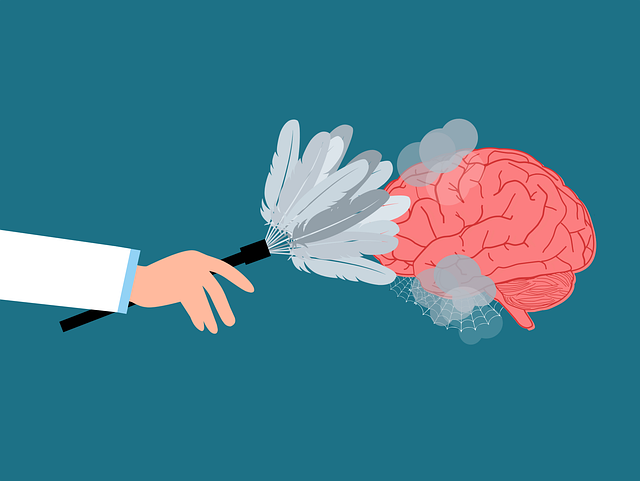Evaluating Longmont Depression Therapy (LDT) combines quantitative data from standardized tools like the Beck Depression Inventory with qualitative feedback from client interviews and sessions. This multi-faceted approach reveals LDT's impact on depressive symptoms, self-awareness, cultural sensitivity in mental healthcare, and self-care routines. By comparing LDT to standard depression treatment practices, researchers can highlight its unique benefits, especially in resilience building and stress management, guiding practitioners in refining mental wellness programs for better individual outcomes.
Mental wellness program evaluations are crucial for understanding the effectiveness of interventions like Longmont Depression Therapy. This article explores diverse assessment methods, from clinical measurements and participant feedback via surveys and interviews to comparative analyses against standard practices. Discovering the impact of Longmont Depression Therapy involves a multi-faceted approach, ensuring comprehensive insights into its success and areas for improvement.
- Assessing Program Impact: Tools and Techniques for Longmont Depression Therapy
- Participant Feedback: Gaining Insights through Surveys and Interviews
- Clinical Measurements: Tracking Progress in Mental Wellness Programs
- Comparative Analysis: Evaluating Longmont Depression Therapy Against Standard Practices
Assessing Program Impact: Tools and Techniques for Longmont Depression Therapy

Evaluating the impact of Longmont Depression Therapy programs is a multifaceted process that involves assessing both individual and collective outcomes. One powerful tool in this assessment is the use of standardized questionnaires and surveys designed to gauge changes in depressive symptoms over time. These tools, such as the Beck Depression Inventory (BDI), allow therapists to track progress by comparing initial assessments with subsequent evaluations. This quantitative data provides tangible evidence of the program’s effectiveness.
Furthermore, qualitative methods, including client feedback sessions and interviews, offer deeper insights into participants’ experiences. This approach facilitates a nuanced understanding of how Longmont Depression Therapy has impacted their self-awareness exercises, fostered cultural sensitivity in mental healthcare practice, and supported the development of self-care routines for better mental health. By integrating both quantitative and qualitative techniques, therapists gain a comprehensive view of the program’s reach and its potential to make lasting positive changes in individuals’ lives.
Participant Feedback: Gaining Insights through Surveys and Interviews

Participant feedback is a vital component of evaluating the effectiveness of any mental wellness program, including Longmont Depression Therapy. Gathering insights from those directly involved offers valuable qualitative data that can highlight areas of success and identify spaces for improvement. Surveys and interviews provide two effective methods to collect this information.
Through structured surveys, participants can anonymously share their experiences, perceptions of self-esteem improvement, and the impact on their mood management skills. This data is quantitative in nature, offering measurable metrics to assess the program’s reach and effectiveness. Additionally, one-on-one interviews allow for deeper exploration of individual journeys, uncovering unique stories that reflect the diverse ways mental wellness programs can transform lives. By integrating both survey and interview feedback, Longmont Depression Therapy can gain a comprehensive understanding of participant experiences, ultimately refining its approach to better serve individuals seeking mind over matter principles for lasting emotional well-being.
Clinical Measurements: Tracking Progress in Mental Wellness Programs

Clinical measurements play a pivotal role in evaluating the effectiveness of mental wellness programs. These quantitative and qualitative tools enable therapists and counselors to track progress over time, gauging improvements in symptoms, functioning, and overall well-being. For instance, standardized assessments like the Beck Depression Inventory (BDI) or the Anxiety Scale can help measure changes in depression or anxiety levels before and after participation in Longmont Depression Therapy programs. These tools provide a structured framework to compare outcomes across different interventions.
Additionally, evaluating mental wellness involves assessing specific aspects such as stress management skills gained through workshops organized by Stress Management Workshops Organization, mindfulness meditation practices, and emotional regulation strategies. Therapists might utilize open-ended questionnaires or semi-structured interviews to capture participants’ perspectives on these areas, providing deeper insights into the program’s impact beyond standardized metrics. Such comprehensive approaches ensure that mental wellness initiatives are not only effective but also tailored to meet individual needs.
Comparative Analysis: Evaluating Longmont Depression Therapy Against Standard Practices

A comparative analysis between Longmont Depression Therapy (LDT) and standard practices for treating depression offers valuable insights into mental wellness program evaluation methods. This approach involves a meticulous examination of various outcomes, including but not limited to symptoms reduction, patient satisfaction, and improvements in quality of life. By comparing LDT against established protocols, researchers can uncover unique strengths and areas for enhancement.
The analysis often delves into aspects such as the efficacy of LDT’s tailored interventions, particularly its focus on resilience building and stress management techniques. This comparative study not only contributes to the growing body of knowledge in mental health awareness but also guides practitioners in refining their approaches. Ultimately, it ensures that programs like LDT are continuously evaluated, allowing for better-tailored care to meet individual needs.
The evaluation of mental wellness programs, particularly focusing on Longmont Depression Therapy, is a multifaceted process. By combining tools like clinical measurements, participant feedback through surveys and interviews, and comparative analyses against standard practices, we can gain comprehensive insights into program impact. These methods allow for a nuanced understanding of what works, what needs improvement, and ultimately, how to enhance the effectiveness of Longmont Depression Therapy. Through diligent evaluation, mental health professionals can ensure that programs remain tailored to participants’ needs, fostering better outcomes and improved mental wellness.











